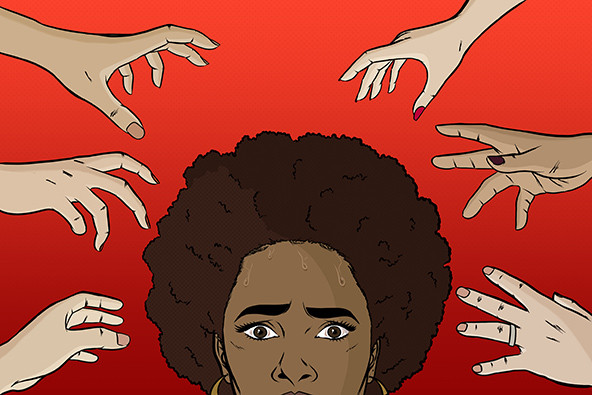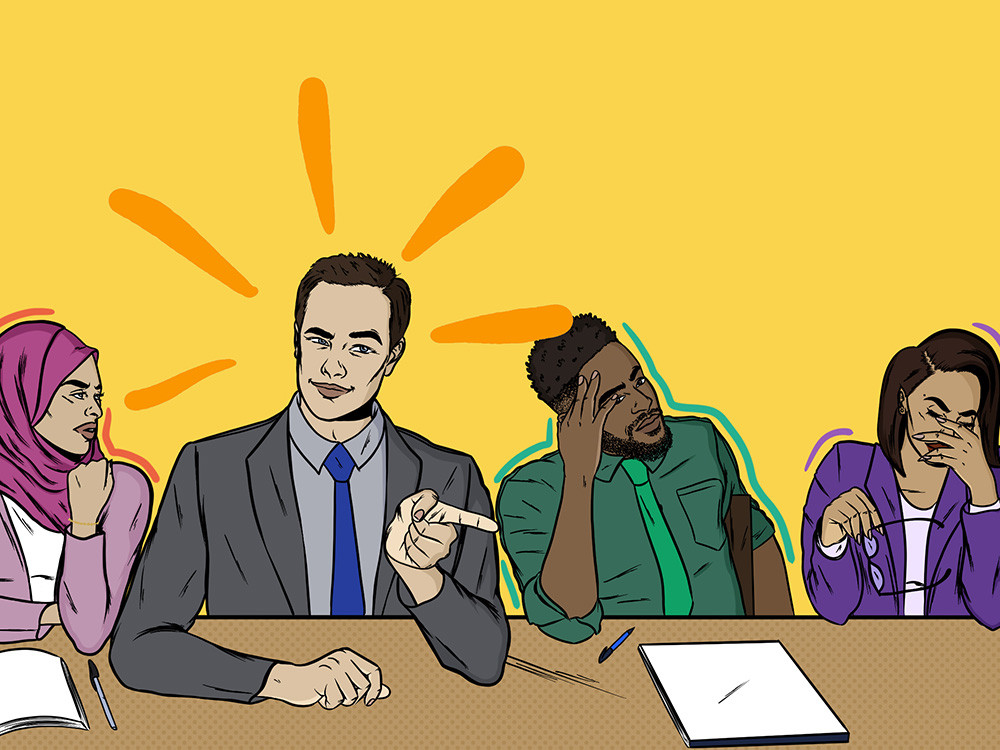 (Illustration by Nyanza D)
(Illustration by Nyanza D)
Diversity, equity, and inclusion (DEI) has become the mainstream approach for how companies attempt to create more inclusive workplaces. Well-meaning employers and employees alike have flocked to the approach as a solution to inequality and other forms of discrimination, through implicit bias trainings, diversity audits, and metrics of representation.
However, DEI has been woefully insufficient in addressing the individual and institutional challenges in workplaces—particularly assaults to personal dignity. Efforts done in the name of DEI can reinforce patterns of tokenism, assimilation, and disrespect that oppress Black and Indigenous employees and leave all employees without the proper tools to dismantle discriminatory organizational and practices.

Global consulting firm Decolonize Design has been outspoken about the many limitations and harms of the DEI industrial complex. Our alternative framework of belonging, dignity, and justice (BDJ) offers a vision for a workplace where we all are welcome, valued, and safe. Dignity, rather than diversity, is the foundation for building work environments that acknowledge and value the humanity of each person. It is the cornerstone upon which organizations can create environments based in belonging and justice.
Dignity as an Organizational Value
Dignity is the concept that espouses the inherent value of every human person regardless of positional power and privilege. Across time and across cultures, it has been one of the most well-understood and respected values. In modern times, the United Nations’ Universal Declaration of Human Rights, written after the Second World War in 1948, begins with the recognition of the “inherent dignity” of all people, which is the “foundation of freedom, justice, and peace in the world.” The 1993 Vienna Declaration reaffirmed that “all human rights derive from the dignity and worth inherent in the human person.”
For Black and Indigenous people, dignity is the actionable affirmation of a person’s inviolable and sacred personhood—a quintessential value for oppressed people who have experienced centuries of dehumanization and discrimination. The particular nuance of this definition—that dignity is the actionable affirmation of personhood—is grounded in the systemic, intergenerational oppression experienced by Black and Indigenous people, as a way to emphasize the intentional effort to recognize the dignity of people who have been denied it historically in Western cultures. For example, the Black women of the Combahee River Collective articulated in their famous 1977 statement that their anti-oppressive work was predicated upon the idea “that Black women are inherently valuable, that our liberation is a necessity not as an adjunct to somebody else’s but because of our need as human persons for autonomy.”
In the context of the workplace, this translates into the ability to participate in the organization knowing their identities will be seen, respected, and protected from bias. According to Donna Hicks, a scholar at Harvard University’s Weatherhead Center for International Affairs, dignity is essential to strong relationships between employees and executives; the lack of it breeds distrust and prevents accountability. In Dignity: Its Essential Role in Resolving Conflict, she contends that “we all yearn to be treated with dignity; it is our highest common denominator,” and it “is the glue that holds all of our relationships together,” personal and professional. It, importantly, differs from “respect” in that it is “the baseline for our interactions”—the premise that all people “are worthy of care and attention,” no matter if we respect them or not.
“When people feel that their value and worth are recognized in relationships, they experience a sense of well-being that enables them to grow and flourish,” she explains. “If, in contrast, their dignity is routinely injured, relationships are experienced as a source of pain and suffering.” Fundamental to Hicks’ argument is that a culture change demands that dignity not just be understood on a personal level but on a systems level, because “without a systemwide understanding of dignity and the role that it plays in our lives and relationships—without everyone in the organization on board—dysfunctional aspects of the broader culture” negatively influence interpersonal workplace relationships.
Dignity Violations
Dignity is fundamental to a thriving workplace. Unfortunately, most workplaces don’t address the everyday verbal and non-verbal dignity offenses which create a hostile and unsafe work environment. These assaults to a person’s dignity, what Hicks coined as “dignity violations,” are incessant, cumulative, and can cause serious harm to Black and Indigenous employees.
First, these violations enable employees who benefit from white dominant culture to preserve their comfort. In other words, these violations maintain the status quo, while Black and Indigenous employees are at best encouraged to minimize or mislabel these violations, and at worst are coerced into assimilating into the dominant workplace culture by disregarding these violations. An example of this is the language of "microaggressions," which is used to describe personal level harms such as when a well-intentioned non-Black person asks to touch a Black employee’s natural hair, or when a Black employee is asked to produce credentials when entering their workplace to prove their employment.
However, the term “microaggression” doesn’t fully convey the serious dignity violation of the action. Not only does this offensive act violate that Black person’s humanity, but if that Black person expresses how they feel personally violated, they are labeled “sensitive” or “angry,” further delegitimizing their personhood and their experience of racism. The offending employees redirect responsibility and mislabel the harm to escape their discomfort at being confronted with their own racist behavior, yet those at the receiving end of these harms suffer the long-term consequences both of this racism and the institutional betrayal they feel by their organization’s apparent indifference to it.
Second, dignity violations that go unaddressed absolve employees of the responsibility for the emotional and psychological labor of the consequences of their decisions. For example, when a white person tells a Black person that “You are so articulate!,” the implication is that Black people in general are not articulate. “The subtext,” Lynette Clemetson writes in The New York Times, “is inherently offensive because it suggests that the recipient of the ‘compliment’ is notably different from other Black people.”
Another seemingly innocuous example is when a white woman says, “As a woman, I understand what it’s like to be a Black person.” Here the white person invalidates and denies the Black person’s experience by claiming it is the same to her own experience of gender. That is, the presumed understanding on perceived sameness negates the real difference of racism and the real harm of racism. Racism and misogyny are systems of discrimination, but they are not equivalent in form or expression.
Finally, dignity violations often illustrate the constant doubt and scrutiny that Black and Indigenous employees face from non-Black employees, with the underlying assumption of their deficiency as compared to their white peers. This often appears as micromanaging, racial gaslighting, and denial of experiences, all of which amount to an undermining of dignity. Racial gaslighting can appear in many ways but some of the most common are passive-aggressive suggestions that Black employees are using the “race card” or are “too sensitive.” These comments that aim to dismiss and discredit experiences make marginalized employees question their perception of reality.
As a Black-led and predominately Black and Indigenous consulting firm, we at Decolonize Design have also experienced dignity violations. Very recently, a prospective client explicitly requested white facilitators for our learning sessions. When asked why they made that request, the client suggested that Black facilitators are somehow incapable of “fully engaging” the organization’s white team members. This demonstrative anti-Blackness was a denial of our expertise, our experience, and the value of our labor. It was absolutely dehumanizing. Our feedback was specific in outlining the dignity violation we experienced in this exchange. However, the response we received—that our violation was simply a “misalignment”—was a deliberate reframing in order to ignore the violation and their responsibility for enacting it. This exemplifies the denial of our realities that Black professionals face daily.
A refusal to address dignity violations constitutes an avoidance of responsibility and a refusal to engage in the labor required to repair harm. The consequence of this abdication is a displacement of the emotional labor onto the violated person, who then is burdened not just with the violation but with finding a solution in order to make their professional life manageable and their workplace tolerable.
Instead of ignoring, dismissing, or mislabeling dignity violations, we must adopt a new approach that offers a pathway to repairing harm based in conflict resolution and accountability.
A Dignity-Centered Approach
The uncompromising stance that every person has value, in particular those who are least valued in society, is essential to a dignity-centered approach, which creates the preconditions to restore connection and community after conflict. While there is no one-size-fits-all approach, organizations must vigilantly protect dignity through community learning and concrete procedures such as written workplace policies that explicitly include the language of dignity.
A workplace environment where the values of dignity and accountability are upheld creates the fertile ground of psychological safety in relationships and the workplace. Black and Indigenous cultures posit that dignity not only pertains to the individual person but expands beyond personhood and implicates our most important relationships, including family, community, workplace, and nation. We all deserve workplaces that actively name—and then eliminate—practices that formally or informally sustain beliefs and behaviors of dehumanization and anti-Blackness.
Instead of the superficial framework of DEI, let’s be honest and work toward dignity affirmation, because acknowledging and repairing harm is how we care for and transform our workplaces. Dignity is essential to resolving conflict, and organizations who are committed to building equitable environments should make sure dignity is at the forefront of their efforts.
Support SSIR’s coverage of cross-sector solutions to global challenges.
Help us further the reach of innovative ideas. Donate today.
Read more stories by Aida Mariam Davis.

